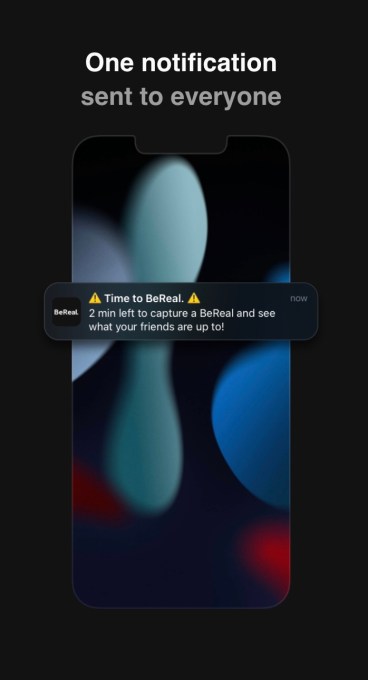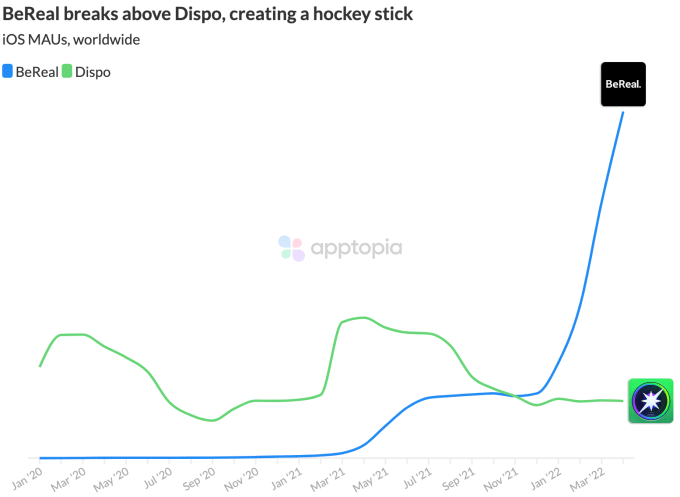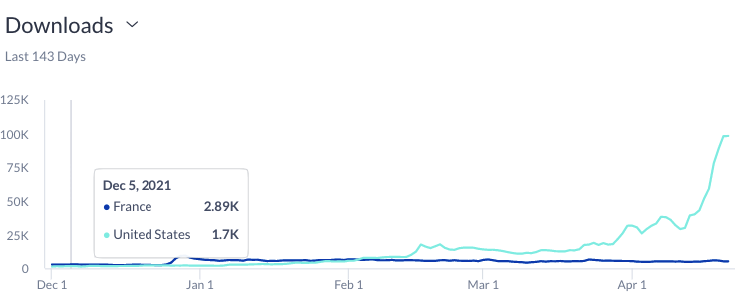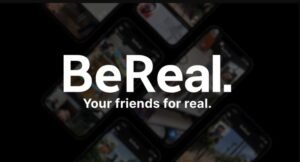An app called BeReal, founded by former GoPro employee Alexis Barreyat along with Kévin Perreau, was launched in December 2019 with its idea of asking users to post an unedited image once a day after receiving a push notification. After receiving the alert, the user has up to 2 minutes to share what they are doing and can see the photos that their friends have also posted.
The app is easy to use and takes a selfie and a photo on the front page at the same time – an experience reminiscent of our fond memories of the long-gone photo app Frontback. (REST IN PEACE).
The company explains that this experience gives users a chance to show who they really are.
The concept itself is not entirely new. In addition to Frontback’s use of dual cameras, a similar idea emerged that involved push notifications, amid a wave of apps trying to suck users away from Instagram a few years ago.

Image credit: Be realistic
An app called Minutiae, launched in 2017, helped the pioneer with the same concept that BeReal is now leveraging: alerts that instruct users to snap whatever they are doing now. Minutiae co-founder Martin Adolfsson recently lamented to TechCrunch that BeReal “borrowed pretty much” from his idea, while proclaiming its authenticity, much to his dismay.
Unfortunately, ideas are not patents. And we’ve seen many apps and products over the years that offer similar social experiences, with only one actually becoming the breakout success of its time. Look at Qik vs. Ustream.tv; Gowalla vs. Foursquare; Phhhoto vs. Boomerang; We Heart It Vs. Pinterest; or more recently, TikTok vs. everyone else trying to clone it.
Plus, while Minutiae would allow users to browse strangers’ photos from around the world, BeReal targets more directly at groups of real-life friends.
There is a certain demand for new photo sharing apps among younger users who are getting tired of Instagram’s constant changes, its encapsulation of new features like Reels and Shopping, and its overly polished creative content. Other apps, like Minutiae and BeReal, have also experimented with unique image-sharing experiences in an attempt to lure users away from Instagram with varying degrees of success.
Poparazzi – an app that transformed Instagram’s tagging feature into its entire premise – hyped itself to the top of the App Store using a series of growth hacks not so long ago. It has since seen its popularity fade and is now No. 87 in the Photo & Video category on the US App Store.
Another app, Dispo, delayed the release of your digital snaps to give itself a nostalgic feel, but aimed at a generation that never knew what it was like to wait for print. It also did not become the next new Instagram and is now No. 143 in Photo & Video in the App Store.

Image credit: Apptopia
BeReal has meanwhile been around for a few years. But app intelligence company Apptopia noted earlier this month that 65% of its lifetime downloads took place in 2022, and its monthly active users had grown 315% from year to date. Today, the company TechCrunch offered updated figures. It found that BeReal has seen 7.67 million downloads year-to-date, representing 74.5% of its lifetime installations. France (where the app is based) and the US lead with a share of 20.5% and 19.7% of the installations, respectively.
The company attributes the growth to a combination of word-of-mouth, BeReal’s college ambassador program and newer features like WidgetMoji and RealMoji – the former, which puts your friends into a Home Screen widget, and the latter, which lets you respond with stickers in iMessage conversations . However, this level of rapid growth typically involves marketing or advertising expenses, not just organic adoption, which would be a slower increase and less sharp jump.

Image credit: Apptopia
BeReal wanted the funds. The a16z and Accel-backed app raised $ 30 million in a Series A last year. It certainly looks like it has spent some of that money.
And as it turns out, at least some of BeReal’s growth had been fabricated to make the app see as if it were a viral hit. University students on Brown’s student paper reported that BeReal paid them $ 30 per referral and $ 50 for an app download with a review. The students would receive the money via PayPal or Venmo, they said. Other student ambassadors organized events and distributed perks, such as free boba, to recruit new users, a report from Rice University’s student paper said.
The current ambassador program runs from January to June 2022, according to BeReal’s website. (BeReal declined to speak to TechCrunch, saying they “are not ready for media.” [sic]. ”)
There’s not really anything wrong with paid user acquisition – after all, that’s how the app ecosystem works. In addition, some paid users become engaged and loyal. That is the goal!
BeReal has so far been successful with this model: Apptopia says that daily active users have reached 2.93 million at the time of writing.
It also has a rating of 4.8 across nearly 22,000 user reviews in the App Store and a rating of 4.5 across nearly 15,000 reviews on Google Play. It’s the No. 4 overall app in the US App Store right now.
That said, it’s a little frustrating to see apps that are committed to buying installations and five star reviews being written so final as Gen Z’s new favorite toy, in articles describing the app’s growth as organic. There may well be a word-of-mouth interest here, but that interest has been combined with good old app installations.
In the early days of the App Store, there were several direct channels for this kind of cash-to-download funnel, until Apple cracked down on companies “buying” their growth. But that only led to more paid user acquisitions behind the scenes. Today we see, in addition to traditional channels – like online ads / social ads, billboards, TV, etc. – things like “viral” TikToks, which were actually hidden influencer marketing deals. Or, as with BeReal, college ambassadors are compensated for hyping an app for a target demographic.
The latter can actually work if the hype puts the app in front of users who end up being charmed by the experience and staying with it.
BeReal probably has a good bit of fuel for user acquisition ahead of it. And since its gimmick involves turning on push notifications, it can retain loyal users over time. But it has a long way to go to prove that it can become part of users’ everyday rotation – something we do not know until the paid procurement effort goes slower and the app is left to itself in the competitive landscape.
Still, we must love BeReal’s download URL: it’s bere.al/downloadthedamnthing.
Okay, why not!
